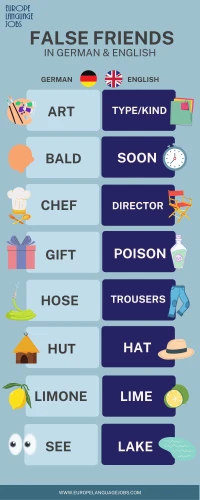
German-English Cognates; Same or Similar Words Used in German and English
German English cognates...there are tons of them! With similar linguistic origins, there exist many German words that either are, or sound, the same in English. Likewise, you will find many English loanwords that have been assimilated into the German language - this is called lexical borrowing - and overall, German and English appear to thrive off a somewhat symbiotic relationship.
Some of the words stolen or appropriated seem logical and sensible and it makes sense that they ended up present in both German and English, whilst others are a little more abstract and make you wonder why on earth one language chose to borrow those very phrases!
German and English are both rich, technical languages whose grammar systems often overlap. In a globalised age where trends quickly go viral and surpass geographical borders, it is no surprise that there has been such an intermingling between the two languages.
Word swapping and loaning is dynamic, exciting, and natural...given the intrinsically fluid characteristic of language itself. Certain Germans, however, are against this open embrace of the international language of English, and spurn the pollution of their own native tongue.
Let us know in the comments whether you believe this linguistic interflow is inevitable and inescapable, or whether it is to the detriment of the German language...
- General Similarities between English and German
- Common English Words Used in German
- Common German Words Used in English
- Very Similar German and English Words (Different Spelling)
- English Words Used in German with a Different Meaning
- German-English False Friends
General Similarities between English and German
Before getting down to the nitty-gritty and comparing specific words, let us recap the general similarities that exist between German and English.
1. Both are Germanic languages
As can be seen in this language family tree, English and German stem from the West Germanic branch of the Indo-European language family and therefore derive from the same syntactic and phonological system. Despite evolving as we trace down the tree, it is natural that the languages born from the same roots have retained many factors in common.
2. Both use the Latin alphabet
English and German use the same 26 letters of the modern Latin alphabet, so you have a head start when reading and sounding out words in the other language as there is no need to adapt to an unfamiliar writing system. The only shock to English eyes might be the umlaut on the vowels (Ää, Öö, Üü) and the Eszett(ß).
3. Both use Arabic numerals
All numbers in German and English (although named differently) are created by using the digits 0-9. Even the way in which numbers are compounded is similar.
In English, “teen” is the suffix: thirteen, fourteen, fifteen...
In German, “zehn” is the suffix: Dreizehn, Vierzehn, Fünfzehn…
Then, whilst English puts the multiples of ten first in thirty-one, for example, German places it after: EinundDreißig.
4. Both have loanwords from Ancient Greek
With a host of customs, philosophies, and engineering that still inspire thinkers and doers today, there aren’t many European languages that escape the influence of Ancient Greece.
Here are some of the most obviously Greek-derived words that are sprinkled throughout German and English...
-
Dilemma
-
Gorilla
-
Marathon
-
Palimpsest
-
Palindrome
-
Paranoia
-
Phantom
-
Saxophon(e)
-
Theologie(y)
-
Therapie(y)
-
Topos
...as well as many other lexical borrowings which are spelled less similarly by the two languages.
5. Both are highly-valued languages in the career world
As the language of international business, the ability to speak English is recognised as a career asset all over the world. In fact, the English is spoken to an adequate level by 1.75 billion people worldwide. German is also a remarkably powerful language in the globalised world of work due to the country’s thriving economy.
Germany has the 4th strongest economy in the world and the largest in Europe. It is no surprise, therefore, that English and German-speaking employees are in such high demand. Our platform is proof of this, with a whopping 75% of job offers requiring English speakers and 24% of job offers for German speakers.
You can read in detail about the top jobs for German speakers or countries to visit if you speak German here, or you can get a rough idea about language demand in Europe from this chart.
Common English Words Used in German
These common English words used in German are mostly banal, everyday vocabulary, and names of objects.
-
Baby
-
Ball
-
Boss
-
Bus
-
Computer
-
E-Mail
-
Fair
-
Flip-flops
-
Hobby
-
Hotel
-
Information
-
Job
-
Name
-
Park
-
Radio
-
Reporter
-
Ring
-
Sweatshirt
-
Taxi
-
Tourist
-
T-Shirt
Common German Words Used in English
Common German words used in English, on the other hand, are often more poetic, abstract concepts.
-
Angst
-
Bildungsroman
-
Delicatessen
-
Doppelganger
-
Eiderdown
-
Ersatz
-
Hamster
-
Kindergarten
-
Kitsch
-
Knapsack
-
Leitmotif
-
Poltergeist
-
Schadenfreude
-
Spritz
-
Wanderlust
-
Weltanschauung
-
Waltz
Very Similar German and English Words (Different Spelling)
These German and English words are so similar that you probably do not need the translation; however, as they are spelled slightly differently, we have added them in case of doubt.
-
Apfel - apple
-
Besser - better
-
Buch - book
-
Bruder - brother
-
Delfin - dolphin
-
Denken - think
-
Essen - eat
-
Foto - photo
-
Freund - friend
-
Garten - garden
-
Gras - grass
-
Haus - house
-
Helfen - help
-
Herz - heart
-
Hoffen - hope
-
Krokodil - crocodile
-
Käse - cheese
-
Lampe - lamp
-
Mann - man
-
Maus - mouse
-
Milch - milk
-
Studieren - to study
-
Tanzen - to dance
-
Telefon - telephone
-
Tochter - daughter
-
Vater - father
-
Wasser -water
-
Zehn - ten

English Words Used in German with a Different Meaning
These are English words that already exist that the Germans have adopted and made their own.
-
Cracker in German = computer hacker
Cracker in English = a biscuit or a Christmas table decoration
-
Evergreen in German = an old song that is still popular
Evergreen in English = a tree that keeps its leaves over more than one growing season
-
Handy - mobile phone
-
Home office in German = work from home
Home office in English = ministerial department of the UK government
-
Messie - a person who is untidy
-
Peeling - body scrub
-
Public viewing in German = people congregating to watch an event
Public viewing in English = seeing the corpse before the funeral
-
Shitstorm in German = social media backlash (used by Angela Merkel herself!)
Shitstorm in English = messy situation
-
Showmaster - TV show host
-
Sprayer - graffiti artist
-
Streetworker in German = social worker
Streetworker in English = prostitute
German-English False Friends
Here are some words in German that an English speaker might think he/she understands just by seeing them, but this sense of familiarity is a trick - hence the name false friends! Some of these are certain to fry your brain.
-
Art - kind/sort/type
-
Bald - soon
-
Billion - trillion
-
Chef - director
-
Direktion - management
-
Fabrik - factory
-
Fraktion - parliamentary group
-
Gift - poison
-
Gymnasium - grammar school
-
Hose - trousers
-
Hut - hat
-
Kind - child
-
Kraft - power/force/strength
-
Limone - lime
-
Lokal - pub
-
See - lake
-
Wer - who
-
Wo - where

There's no doubt about it from examining these cognates: German and English have a huge amount of overlap in terms of common words. You can find the same exact words, similar versions, or even different meanings of the same spelling between the two languages that have a history of borrowing from each other.
If you speak one of these languages, this is your sign to start learning the other! These similar words will speed up the process of assimilation tenfold! And if you get muddled, just stick to Denglish!
Feeling inspired? Visit our blog for more career advice! How can you be sure the information we provide is top-notch? We are a group of professionals working with recruiters, career coaches, and HR specialists from all over the world!
Trust our experience and let us help you find a new job in Europe!


